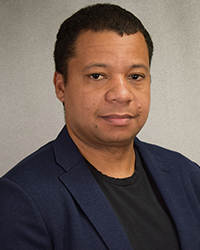The Value of Creative, Cross-Disciplinary Work: Bringing Together the Theoretical and the Practical

Leon Espira, MPH ’15
PhD Student in Epidemiology, Jacquez Koopman Simon Longini Complex Systems Epidemiology Scholar
Growing up in rural western Kenya, I understood early on that human health cannot be defined by studies and metrics alone but rather is the sum of everything a human encounters. How can we expect a mother of five to worry about the quality of water she uses when she isn’t sure she can provide her children a single meal that day? For her, the need to feed her children is immediate and tangible, while the quality of water is an abstract idea that may or may not affect her children’s survival.
After studying both genetics and cardiac physiology in Canada, I joined a team in the Netherlands working on the development of electronic sensors for pathogen detection. I then worked with a regenerative medicine startup on the West Coast of the US. Through these experiences, I began noticing significant gaps between the theoretical and the practical.
What good are rapid, point-of-use sensors for the detection for disease when there is no infrastructure to treat the disease following diagnosis?
The developed world’s research and technology innovations are often driven by market forces and consumer needs. Meanwhile, the emerging world is littered with well-meaning but poorly implemented projects that fail because theory does not match reality. For example, what good are rapid, point-of-use sensors for the detection for disease when there is no infrastructure to treat the disease following diagnosis?
The field of epidemiology provides many bridges for these gaps. Epidemiology trains professionals across disciplines so that solutions integrate a variety of perspectives, including health, culture, policy, and economics. In my work, I hope to help develop long-term solutions that combine technology with social insights and emphasize women’s empowerment, children’s health, and local entrepreneurship.
The very nature of public health is cross-disciplinary. And in my experience, this collaboration trait is exemplified in the scholarly community created by the Integrated Training in Microbial Systems (ITiMS) program. As I made the jump from laboratory science, where I had a wealth of experience, to field epidemiology, ITiMS made the transition easier by enabling me to connect with peers and to form learning communities around interdisciplinary ideas and projects.
The very nature of public health is cross-disciplinary.
ITiMS is a cross-disciplinary training program at the University of Michigan designed to help students build skills in multiple fields, including molecular biology, mathematical modeling, statistics, bioinformatics, and population science. This cross-disciplinary approach to training is a core strength of ITiMS. The program encourages student-led learning, which enables the community of fellows and associates to find learning experiences most relevant to their needs. And it not only integrates but builds on those experiences by exposing students to other disciplines and approaches.
Being in a cross-disciplinary community allows me to integrate a wide variety of skills and lets me draw from and build upon my background in genetics and physiology. My PhD work in epidemiology focuses on understanding pathogen transmission in water and community-wide effects of sanitation access. In Ethiopia, we are studying how sanitation improvements in one household effects neighboring households. In Mexico, we study the risk of disease from exposure to canals carrying untreated wastewater.
I was challenged to see my work from other perspectives and to understand how different fields would approach similar problems.
Working at such diverse sites presents opportunities and challenges. I rely on tried and tested field techniques while also thinking about how to integrate molecular biology and bioinformatic techniques into my work. And I work closely with a variety of partners in all of this.
The ITiMS community’s learning processes improved my work on these projects because I knew how to draw on a network of peers and mentors. I was challenged to see my work from other perspectives and to understand how different fields would approach similar problems. And ITiMS provides an invaluable network of inclusive and collaborative learning that challenges me to think beyond my formal training. Currently, I am drawing on the ITiMS community to learn how to use bioinformatics to better understand my data from Ethiopia.
Human encounters—from contact with a pathogen to social engagement to national politics—shape our daily realities. As public health professionals, we all should be working across a variety of fields and engaging a variety of partners and communities to develop the very best solutions to our health problems. As an epidemiologist, I am committed to creatively considering all possibilities in understanding disease and implementing effective interventions that help local and global communities thrive.
- Read more articles by Michigan Public Health students.
- Learn more about UM’s Integrated Training in Microbial Systems program.
- Support research at Michigan Public Health.
 Leon Espira holds a BSc in genetics and an MSc in physiology from the University of
Manitoba and a Master of Public Health degree in general epidemiology from the University
of Michigan School of Public Health, where he is a PhD student in epidemiologic science. His current research focuses on understanding how
sanitation interventions affect pathogen transmission and diarrheal disease risk in
Ethiopia and Mexico. In Mexico, he studies how water treatment impacts pathogen loads
in canals that carry waste water for use in crop irrigation. In Ethiopia, his work
characterizes how sanitation levels affect the types of pathogens that cause diarrhea
in infants. In 2019, he was named a fellow of the Integrated Training in Microbial
Systems (ITiMS) program.
Leon Espira holds a BSc in genetics and an MSc in physiology from the University of
Manitoba and a Master of Public Health degree in general epidemiology from the University
of Michigan School of Public Health, where he is a PhD student in epidemiologic science. His current research focuses on understanding how
sanitation interventions affect pathogen transmission and diarrheal disease risk in
Ethiopia and Mexico. In Mexico, he studies how water treatment impacts pathogen loads
in canals that carry waste water for use in crop irrigation. In Ethiopia, his work
characterizes how sanitation levels affect the types of pathogens that cause diarrhea
in infants. In 2019, he was named a fellow of the Integrated Training in Microbial
Systems (ITiMS) program.
